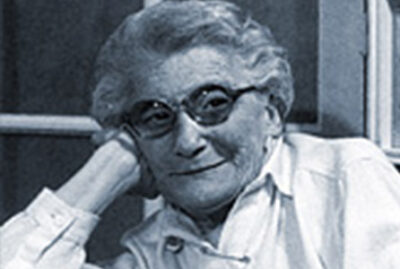
France
Claude Arrieu was born Louise-Marie Simon in Paris in 1903. She began experimenting with piano improvisation in early childhood, and discovered orchestral music when listening to Stravinsky’s Feu d’artifice in 1915. She joined the Paris Conservatory’s harmony class in 1924, followed by fugue and counterpoint training in 1926, choosing her pseudonym that same year. She studied composition under Paul Dukas beginning in 1928, and won a first prize in 1932. Her symphonic piece Mascarades (1928) was performed at the Straram Concerts as early as 1929. She joined the French Radio Broadcasting Service in 1935 as a programme editor, and passed the programme director examination in 1936, leading to her meeting with Pierre Schaeffer. During the war, she followed the French Radio Broadcasting Service in its various relocations across France. After the liberation of France, she worked in the department of production music as Henri Dutilleux’s deputy. Her score Frédéric Général won the Italia prize in Venice in 1949. Previously, between 1943 and 1944, she had composed the music for the radio opera La Coquille à Planètes, on a libretto by Pierre Schaeffer. One of her major works was written in 1944: Cantate des sept poèmes d’amour en guerre, on poems by Paul Éluard, completed in 1945. In 1947, she left the French Radio Broadcasting Service to focus on composing, though she continued to take numerous commissions. It is estimated that she wrote over 400 pieces. Alongside symphonic pieces, chamber music (mainly for wind orchestras), piano pieces, mélodies and choir pieces, she also enthusiastically embraced new forms and techniques (production music, scores for advertisement films, children’s records, etc.). The delicate and varied nature of her orchestration is of particular note, as well as her marked taste for rhythm – dance rhythms in particular. Her opéras comiques and opéras bouffes, of which she was particularly fond, were all critical successes. As early as 1929, Émile Vuillermoz praised the originality of her voice: “This music has character and strength. It creates a formula of deadpan humour and laid-back agility, whose accent is quite new in today’s music.”
– Florence Launay, based on Françoise Masset, Une Femme et un compositeur : Claude Arrieu, Master’s dissertation, supervised by Danièle Pistone, Université de Paris-Sorbonne, 1985 –
[Traduction en anglais : Raphaël Meyer]
– Florence Launay, based on Françoise Masset, Une Femme et un compositeur : Claude Arrieu, Master’s dissertation, supervised by Danièle Pistone, Université de Paris-Sorbonne, 1985 –
[Traduction en anglais : Raphaël Meyer]
List of Works
Useful links
Contributor:
Présence Compositrices - last updated 16 December 2024